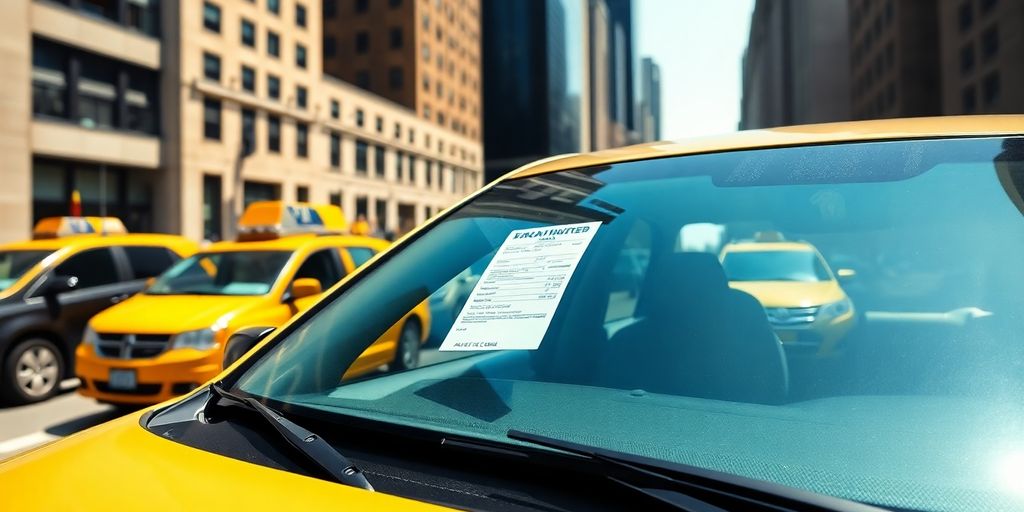Dealing with NYC parking tickets can be a real headache. It seems like there’s always a new rule or sign to figure out, and getting a ticket just adds to the stress. But don’t worry, this guide is here to help you understand the common tickets, read those confusing signs, and even fight back when you think a ticket isn’t fair. We’ll give you some practical tips to help you park smarter and avoid those costly fines. Let’s make parking in NYC a little less painful.
Key Takeaways
- Knowing the specific rules for common parking violations, like fire hydrants and bus stops, can save you money.
- Understanding what different parking signs mean is super important for avoiding tickets.
- You can actually fight many tickets, especially if you know what information to look for and how to collect proof.
- The NYC parking ticket system is big, and knowing how it works can help you navigate it better.
- Following simple tips and using available resources can help you avoid problems and park safely.
Understanding Common NYC Parking Tickets
Fire Hydrant Violations: Rules and Exceptions
Parking near fire hydrants in NYC is a common source of tickets. The general rule is that you can’t park within 15 feet of a fire hydrant. However, there are exceptions. For example, you can park within 15 feet of a hydrant between sunrise and sunset if a licensed driver stays in the vehicle. It’s important to know the exact distance and time restrictions to avoid a ticket.
Navigating Bus Stop Zones
Bus stop zones can be tricky. Do you know where a bus stop ends? Parking in a bus stop zone, even for a short time, can result in a ticket. The length of a bus stop is usually indicated by signage or markings on the curb. Be aware that these zones are actively enforced, and it’s easy to misjudge the boundaries. Always double-check before parking, and don’t assume you’re safe just because there isn’t a bus present. Understanding bus stop zones is key to avoiding fines.
The Three No’s: No Standing, No Stopping, No Parking
These three terms have very specific meanings in NYC parking regulations, and it’s important to understand the differences:
- No Standing: You can temporarily stop to drop off or pick up passengers, but you can’t wait or load/unload goods.
- No Stopping: You can only stop to obey a traffic signal, avoid conflict with other traffic, or at the direction of a police officer.
- No Parking: You can temporarily stop to load or unload passengers or merchandise, but only for as long as it takes.
These restrictions are often indicated by signs, but sometimes they are implied by the location (e.g., near a crosswalk). Ignoring these rules can lead to a costly ticket.
Alternate Side Parking Regulations
Alternate side parking (ASP) is a unique challenge for NYC drivers. It requires moving your car on certain days and times to allow for street cleaning. Failing to move your car during ASP times results in a ticket. ASP schedules can vary by street and borough, so it’s important to check the signs carefully. Many drivers use apps or websites to track NYC parking rules and avoid ASP tickets. Be aware that ASP rules are often suspended for holidays or emergencies, so stay informed about any changes to the schedule.
Deciphering NYC Parking Signs and Regulations
Navigating the streets of New York City can feel like trying to solve a complex puzzle, especially when it comes to parking. The city’s parking regulations are notoriously intricate, and understanding them is key to avoiding costly tickets and unnecessary stress. Let’s break down some of the most important aspects of NYC parking signage and rules.
Interpreting Complex Parking Signage
NYC parking signs often combine multiple regulations on a single pole, leading to confusion. It’s important to read each sign carefully and consider all the information presented. Pay attention to the order of the signs, the days and times specified, and any exceptions noted. Sometimes, a sign indicating a restriction (like ‘No Parking’) might be directly above a sign allowing parking at certain times, creating a confusing situation. Always assume the most restrictive rule applies unless you can definitively prove otherwise. It might be helpful to check out a power point presentation about how to understand NYC parking sign language.
- Check for multiple signs on one pole.
- Note the order of the signs; the top sign usually takes precedence.
- Look for time restrictions and days of the week.
Parking signs in NYC can be tricky. Always double-check that you understand all the rules before leaving your car. A few extra seconds of observation can save you a lot of money and hassle.
Muni Meter Parking Rules Explained
Muni Meters are a common sight in NYC, offering a convenient way to pay for parking. However, there are specific rules to follow to avoid getting a ticket. Always check the meter’s instructions carefully, as rules can vary by location. Make sure to enter your license plate number correctly and keep your receipt displayed on your dashboard. Be aware of the maximum time allowed and return to your car before the meter expires. Some meters may have time restrictions during certain hours, even if you’ve paid. Exhibit’#8′ is a copy of muni meter receipt showing I paid for the time to park.
- Enter your license plate number correctly.
- Display the receipt clearly on your dashboard.
- Be aware of time limits and restrictions.
Understanding Pedestrian Ramp Restrictions
Parking near pedestrian ramps is strictly prohibited in NYC. These ramps are designed to provide accessibility for individuals with disabilities, and obstructing them can result in a hefty fine. The area near a pedestrian ramp is usually marked with painted lines or a sign, but even if it’s not clearly marked, it’s best to avoid parking there. Remember, these ramps are essential for accessibility, and blocking them can create significant challenges for pedestrians. You are prohibited from parking within 15 feet of a fire hydrant.
Strategies for Contesting NYC Parking Tickets

Identifying Beatable Tickets
Not all parking tickets are created equal. Some are slam-dunk wins for the city, while others have loopholes you can exploit. The first step is to carefully examine your ticket for errors. Is your license plate number wrong? Is the location vague or inaccurate? These small mistakes can be your ticket to freedom. Knowing what to look for is half the battle.
- Expired inspection stickers are a common reason for tickets, but if you can prove you had a valid sticker at the time, you have a case.
- Missing or obstructed signage is another frequent issue. If the parking sign was hidden by a tree or missing entirely, document it.
- Emergency situations, like a medical emergency, can sometimes get a ticket dismissed, but you’ll need solid proof.
It’s important to remember that honesty is the best policy. Don’t try to fabricate evidence or make up stories. A judge will see right through it, and it will hurt your credibility.
Gathering Required Elements for Your Defense
So, you think you have a beatable ticket? Great! Now it’s time to build your case. This means gathering all the necessary documents and information to support your claim. A well-prepared defense is key to success. Make sure you have all your ducks in a row before submitting your dispute. You’ll need to present a clear and convincing argument. This is where attention to detail really pays off. If you’re contesting a traffic ticket, make sure you have all the necessary documentation.
- A copy of the parking ticket itself.
- Your vehicle registration and insurance information.
- Any photos or videos that support your claim.
- Witness statements, if applicable.
Leveraging Photographic Evidence
In the age of smartphones, photographic evidence is your best friend. A picture is worth a thousand words, especially when it comes to fighting parking tickets. Did the sign say one thing, but the street markings say another? Snap a photo! Was the fire hydrant not working? Get that picture! Visual evidence can be incredibly persuasive.
Consider these scenarios where photos can help:
- Obstructed Signs: A photo showing a sign blocked by a tree branch.
- Missing Signs: A photo of the location where a sign should be, but isn’t.
- Defective Equipment: A photo of a broken meter or a malfunctioning fire hydrant. One woman won her case because she photographed a broken fire hydrant and proved it wasn’t pumping water.
| Type of Evidence | Description
The NYC Parking Ticket System
How Parking Tickets Are Issued
So, how do you actually get one of these lovely NYC parking tickets? Well, it usually starts with a Parking Enforcement Agent, sometimes referred to (not always affectionately) as a "parking ticket warrior." These agents patrol the streets, looking for violations. They can issue tickets electronically using handheld devices, or the old-fashioned way with paper tickets.
Here’s a quick rundown of the process:
- Observation: The agent observes a vehicle parked in a potentially illegal spot.
- Verification: They check the signs and regulations to confirm a violation.
- Issuance: If a violation exists, they issue a ticket, noting the details (location, time, offense, etc.).
- Placement: The ticket is typically placed on the vehicle’s windshield or, in some cases, handed directly to the driver.
It’s important to remember that even if you don’t see the agent issue the ticket, it doesn’t mean you didn’t get one. They can mail it to the registered owner of the vehicle based on license plate information.
Understanding Ticket Revenue and Enforcement
NYC generates a lot of money from parking tickets. Where does all that cash go? A big chunk of it goes into the city’s general fund, which helps pay for various services and programs. The revenue is also used to fund the Department of Transportation (DOT) and other agencies involved in traffic management and enforcement. In 2011, approximately 9.5M parking tickets were issued generating more than $570M in revenue.
Here’s a simplified look at how the money flows:
- Parking ticket issued.
- Payment collected by the city.
- Revenue deposited into the general fund.
- Funds allocated to city services and agencies.
Enforcement is a key part of the system. The city uses parking regulations to manage traffic flow, ensure public safety, and provide access for emergency vehicles. Stiff fines are intended to deter illegal parking and encourage compliance with the rules. You can fight a nyc parking ticket online if you think it was issued unfairly.
The Role of Parking Ticket Warriors
Parking Enforcement Agents, or "parking ticket warriors," play a crucial role in maintaining order on NYC streets. Their job is to enforce parking regulations, which, let’s be honest, isn’t always the most popular task. They have quotas to meet, and they’re under pressure to issue a certain number of tickets each day. This pressure can sometimes lead to mistakes or questionable calls, which is why it’s important for drivers to know their rights and be prepared to contest a ticket if they believe it was issued in error. Many people fall prey to indecipherable parking signs, and voracious bus stop zones. You can find hedge fund job opportunities in NYC, but you need to know your rights first.
Here are some things to keep in mind about Parking Enforcement Agents:
- They are trained to identify parking violations.
- They have the authority to issue tickets.
- They are expected to meet performance standards.
Key Legal Defenses for NYC Parking Tickets
Challenging Incorrect Ticket Information
One of the most common, and often successful, defenses against a NYC parking ticket involves pointing out errors on the ticket itself. Accuracy is key when it comes to parking tickets, and even minor mistakes can invalidate the ticket. This is because the information on the ticket must precisely match the reality of the situation. For example, if your license plate number is recorded incorrectly, or if the location of the violation is wrong, you might have grounds for a dismissal.
Here’s what to look for:
- Incorrect License Plate: Double-check that the plate number, state, and any other identifying marks are accurate.
- Wrong Vehicle Description: Make sure the make, model, and color of your car are correctly noted.
- Inaccurate Location: Verify the street address, cross-streets, and which side of the street the violation occurred on.
- Time and Date Discrepancies: Ensure the time and date of the violation are accurate. Even a small error can be significant.
Remember, the burden of proof lies with the city. If they can’t prove the ticket’s accuracy, you have a strong case.
Disputing Unjustified Violations
Sometimes, you might receive a parking ticket even when you believe you were parked legally. In these situations, it’s important to gather evidence to support your claim that the violation was unjustified. This could involve demonstrating that the parking signs were unclear, obstructed, or missing altogether. Or, maybe there were extenuating circumstances that made it impossible for you to comply with the parking regulations. For example, a sudden medical emergency might force you to park illegally.
Here are some common scenarios where you might dispute a ticket:
- Obstructed or Missing Signs: If a sign was blocked by a tree, construction, or was simply not there, you can argue that you weren’t properly informed of the parking rules.
- Confusing Signage: NYC parking signs can be notoriously complex. If you can demonstrate that the signs were ambiguous or contradictory, you might have a case.
- Emergency Situations: Documented emergencies, such as a medical crisis, can sometimes justify a parking violation. Make sure to have proof, like a doctor’s note.
- Mechanical Failure: If your car broke down and you were forced to park illegally, provide evidence of the breakdown, such as a repair bill or tow truck receipt.
Legal Precedents and Recent Legislation
Understanding relevant legal precedents and recent legislation can significantly strengthen your defense against a parking ticket. Court decisions and new laws can clarify existing regulations, create exceptions, or even invalidate certain types of tickets. For example, there might be a legal precedent that supports your argument about challenging incorrect ticket information due to unclear signage. Staying informed about these developments can give you an edge in your dispute. Also, understanding the role of Atlanta car accident attorney can be helpful in related legal situations.
Here’s how to stay informed:
- Research Relevant Cases: Look for court cases that are similar to your situation. A favorable ruling in a previous case can support your argument.
- Monitor Legislative Updates: Keep an eye on new parking laws and regulations passed by the city council. These changes can impact the validity of your ticket.
- Consult Legal Resources: Websites and organizations dedicated to parking ticket defense often provide information on legal precedents and recent legislation.
Practical Tips for NYC Drivers

Avoiding Common Parking Pitfalls
Okay, let’s be real, parking in NYC is like navigating a minefield. One wrong move and BOOM, you’ve got a ticket. So, how do you dodge those pesky parking pitfalls? First, always double-check the signs. I know, they’re confusing, but take the extra minute.
Here’s a few things I’ve learned the hard way:
- Never assume a spot is legal just because others are parked there. They might all be getting tickets too!
- Be extra careful around fire hydrants. The 15-foot rule is no joke.
- Don’t even think about stopping in a "No Stopping" zone, even for a second. Seriously, not even to drop someone off.
It’s better to circle the block a few times than to risk a ticket. Trust me, your wallet will thank you.
Best Practices for Parking Safely
Safety first, people! It’s not just about avoiding tickets; it’s about protecting your car and yourself. Here’s my rundown:
- Parallel parking like a pro. Practice makes perfect, and a good park job can save you from dings and dents.
- Be aware of your surroundings. Look for traffic violations and pedestrians before you pull into or out of a spot.
- Fold in your side mirrors. It’s a small thing, but it can prevent them from getting clipped by passing cars.
Resources for Drivers
Don’t go it alone! There are resources out there to help you navigate the crazy world of NYC parking.
- The NYC DOT website. It has all the official rules and regulations.
- Parking apps. Some apps show you available parking spots and even alert you to street cleaning schedules.
- Hedge Think and other online forums. You can ask questions and get advice from other drivers who’ve been there, done that.
And remember, when you’re right, fight! If you think you got a ticket unfairly, contest it. You might just win!
Wrapping Things Up: Your NYC Parking Ticket Game Plan
So, we’ve gone over a lot about NYC parking tickets. It might seem like a lot to take in, but really, it’s about knowing a few key things. Remember, understanding the rules, even the tricky ones, can save you money and a headache. Sometimes, a ticket is just a ticket, and you pay it. But other times, if you think it’s wrong, you can fight it. Just make sure you have your facts straight and any proof you need. Being prepared is a big help. Hopefully, this guide makes parking in New York City a little less stressful for you. Drive safe, and good luck out there!
Frequently Asked Questions
How much do NYC parking tickets cost?
NYC parking tickets can range from as low as $35 for an expired meter to $180 for parking in a spot reserved for handicap vehicles. There are 99 different types of parking tickets in total.
What’s the rule for parking near fire hydrants?
You can’t park within 15 feet of a fire hydrant. However, you can stop there during the day (sunrise to sunset) if a licensed driver stays in the car.
What’s the difference between ‘No Standing,’ ‘No Stopping,’ and ‘No Parking’?
A ‘No Standing’ zone means you can stop briefly to let someone out or pick them up, but you can’t leave your car. ‘No Stopping’ means you can’t stop for any reason, not even to drop someone off. ‘No Parking’ means you can stop to load or unload things, or pick up/drop off people, but you can’t leave your car unattended.
What is alternate side parking?
Alternate side parking rules are for street cleaning. You have to move your car from one side of the street to the other during certain hours so street sweepers can clean. If you don’t, you’ll get a ticket.
How do muni meters work?
Muni meters are machines where you pay for your parking time and get a receipt. You need to display this receipt on your dashboard so parking officers can see it. NYC is slowly replacing old mechanical meters with these newer muni meters.
Can I fight a parking ticket in NYC?
Yes, you can fight a parking ticket if you think it’s wrong. You’ll need to gather proof, like photos, and show that the ticket information is incorrect or that you didn’t actually break the rule.

Peyman Khosravani is a global blockchain and digital transformation expert with a passion for marketing, futuristic ideas, analytics insights, startup businesses, and effective communications. He has extensive experience in blockchain and DeFi projects and is committed to using technology to bring justice and fairness to society and promote freedom. Peyman has worked with international organizations to improve digital transformation strategies and data-gathering strategies that help identify customer touchpoints and sources of data that tell the story of what is happening. With his expertise in blockchain, digital transformation, marketing, analytics insights, startup businesses, and effective communications, Peyman is dedicated to helping businesses succeed in the digital age. He believes that technology can be used as a tool for positive change in the world.








